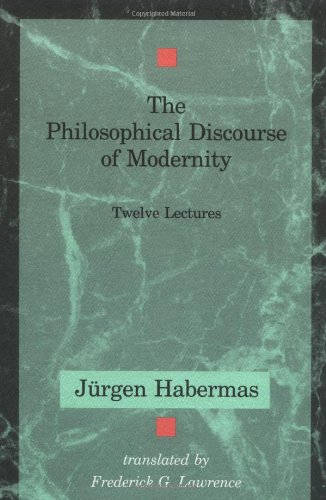The Philosophical Discourse of Modernity book download
Par cooper alice le lundi, septembre 5 2016, 21:45 - Lien permanent
The Philosophical Discourse of Modernity. Frederick Lawrence, Jurgen Habermas, Thomas McCarthy

The.Philosophical.Discourse.of.Modernity.pdf
ISBN: 0745608303,9780745608303 | 456 pages | 12 Mb

The Philosophical Discourse of Modernity Frederick Lawrence, Jurgen Habermas, Thomas McCarthy
Publisher: Polity Press
Bernstein has an intriguing argument in Recovering Ethical Life in defence of Foucault and Derrida (and presumably other postmodernists) against Habermas' concerns outlined in The Philosophical Discourse of Modernity. Scientific reasoning does not sit easily with the presuppositions of any religion, and the work of Enlightenment philosophers made the belief in God appear irrational…It is easy to imagine Mohammed Atta, at Hamburg . (truth, power, normality, normativity). The book is The Philosophical Discourse of Modernity . This perspective is precisely part of a discourse of modernity that is established in the 19th century in the wake of the Industrial Revolution and becomes dominant in the USA after the Scopes trial in the 1920s. Of late, numerous dialogues have been made concern with the width of currents of modernity. The single most important reading of the first generation Frankfurt School is Jürgen Habermas' The Philosophical Discourse of Modernity . The roots of modernity get at the philosophical discourses of enlightenment. Jürgen Habermas, 'The Philosophical Discourse of Modernity' (1985). As an example of this contrast, I refer to the famous critique against Foucault leveled by Habermas in The Philosophical Discourse of Modernity: Twelve Lectures (Habermas, 1987). Aletheia [unconcealedness; truth] could be the word that offers a hitherto unnoticed hint concerning the essence of esse [to be]. Jon Cogburn said in reply to bzfgt I'm sorry bzfgt. Much better to follow Habermas, who in the Philosophical Discourses of Modernity endeavors to engage in conversation with the great thinkers he assays. �Jürgen Habermas, The Philosophical Discourse of Modernity (1985; trans.